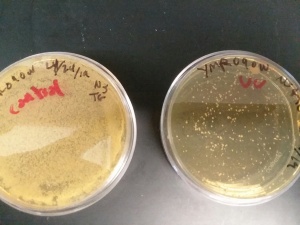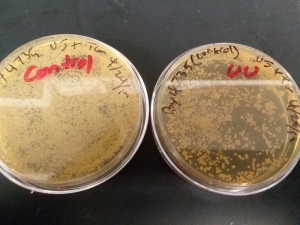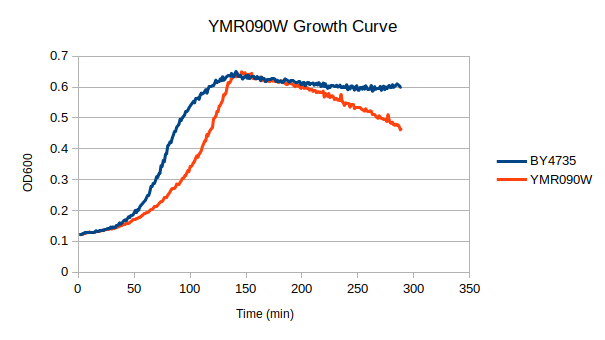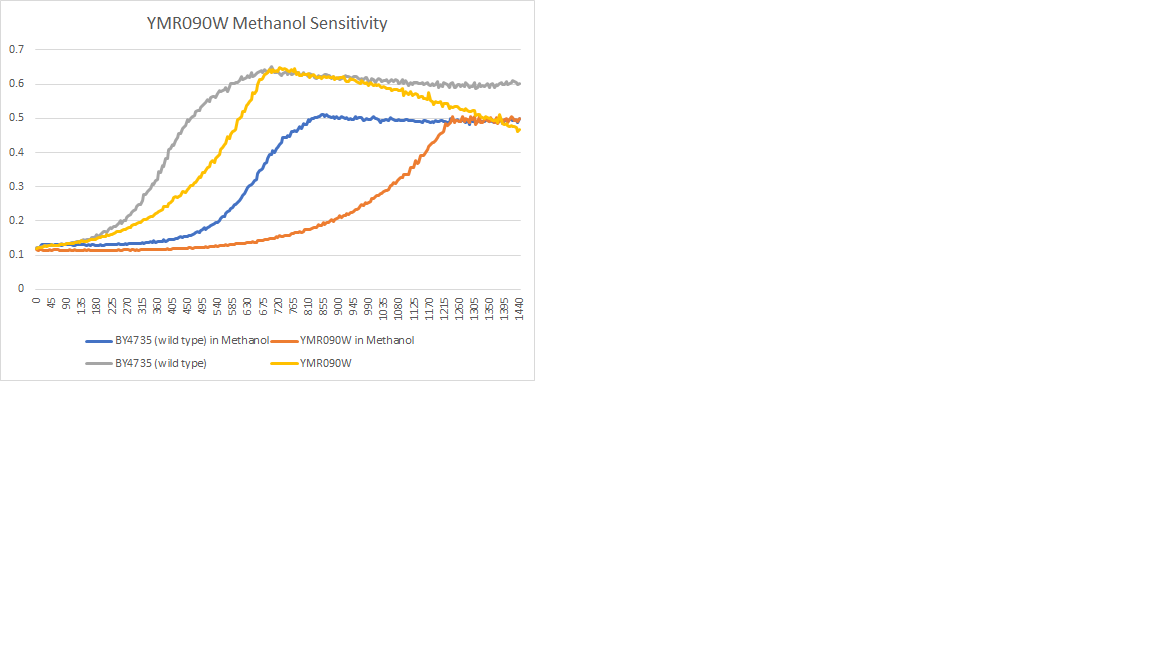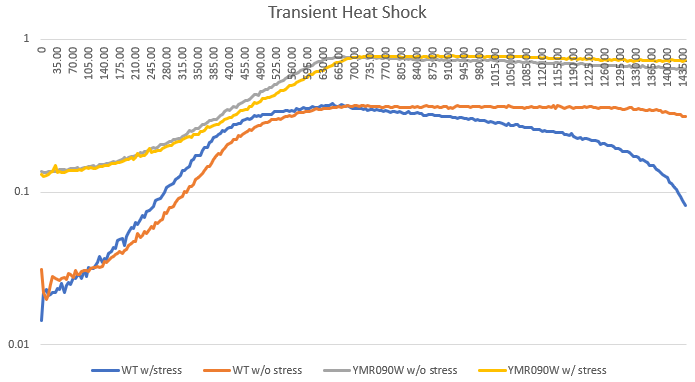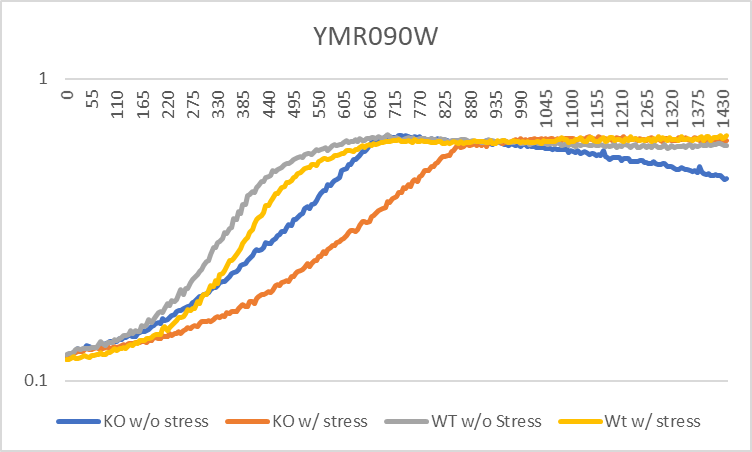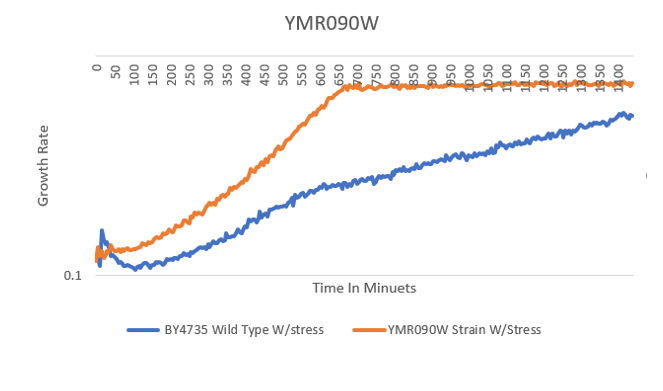Difference between revisions of "YMR090W"
(→Community Commentary) |
|||
| Line 111: | Line 111: | ||
[[File:pH-YMR090W.PNG]] | [[File:pH-YMR090W.PNG]] | ||
| + | |||
| + | ===Cold Shock Sensitivity=== | ||
| + | [[File:YMR090WBB.png]] | ||
| + | Cold Shock Protocol [[https://wiki.yeastgenome.org/index.php/UW-Stout/Cold_Shock]] | ||
==References== | ==References== | ||
<!-- REFERENCES ARE AUTOMATICALLY GENERATED. PLEASE DON'T EDIT THIS SECTION--> | <!-- REFERENCES ARE AUTOMATICALLY GENERATED. PLEASE DON'T EDIT THIS SECTION--> | ||
{{RefHelp}} | {{RefHelp}} | ||
Revision as of 16:33, 9 May 2019
Share your knowledge...Edit this entry!
| Systematic name | YMR090W |
| Gene name | |
| Aliases | |
| Feature type | ORF, Uncharacterized |
| Coordinates | Chr XIII:449245..449928 |
| Primary SGDID | S000004696 |
Description of YMR090W: Putative protein of unknown function with similarity to DTDP-glucose 4,6-dehydratases; GFP-fusion protein localizes to the cytoplasm; up-regulated in response to the fungicide mancozeb; not essential for viability[1][2][3]
Contents
- 1 Community Commentary
- 2 References
Community Commentary
About Community Commentary. Please share your knowledge!
UW-Stout/Sensitivity To Nitrogen Starvation
Knocking out the YMRO90W seems to have no effect on growth after incubating for 5 days on the Nitrogen omitted media.
Ultraviolet Sensitivity
YPL068C is more sensitive than YMR090W given that there is less colonizes present when under the same stress.
DNA and RNA Details
Other DNA and RNA Details
Other Topic: expression
Specifically higher expression in nitrogen limited chemostat cultures versus nitrogen excess. [4] [5]
This gene is part of the UW-Stout Orphan Gene Project. Learn more here.
Growth Curve
In a BY4735 background, knocking out YMR090W seems to have a moderate effect on growth rate in log-phase. In this assay, the BY4735 strain's doubling time was 124 minutes, while the YMR090W knock-out strain's doubling time was 208 minutes.
G-418 Stress
In the BY4735 background, knocking out YMR090W seems to have a little effect on the growth rate. In the knock-out experiment, the BY4735 strain's doubling time was 149 minutes, whereas the YMR090W knock-out strain's doubling time was 242 minutes. The calibration experiment, the BY4735 strain's doubling time was 64 minutes, whereas the YMR090W knock-out strain's doubling time was 95 minutes.
Methanol Sensitivity
The wild type had a doubling time of 170 min, the YMR090w had a doubling time of 225 min. The doubling time increased for both after we added the methanol which means that this strain is sensitive.
Heat Shock
Heat shock had no change on the doubling time, but the starting amount of yeast cells less. The heat seemed to kill off the cells, the longer they were in the hot water bath.
Stressing with Hydroxyurea
Hydroxyurea Protocol -The wild type strain had only a small difference in doubling time when stressed with Hydroxyurea;YMR090W showed about a 30 minute difference in doubling time compared to the wild type strain, indicating that this gene most likely plays a role in DNA replication.
Fermentation
Fermentation protocol link [2] - There appears to be no major difference in fermentation rate. The lower final ethanol percentage could be a result of evaporation. If this experiment were to be carried out again then it should be done in an air tight container.
Caffeine Sensitivity
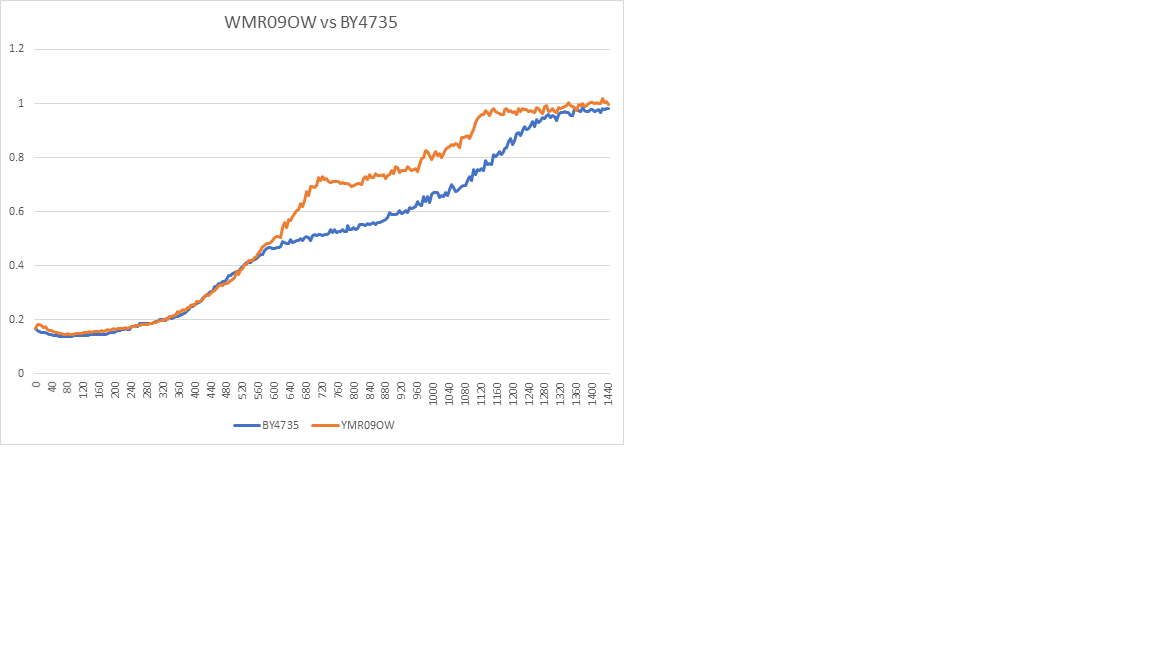 Caffeine protocol UW-Stout/Caffeine, the graphs look as if the genes reacted very similarly.
Caffeine protocol UW-Stout/Caffeine, the graphs look as if the genes reacted very similarly.
Stressing with pH
pH stress protocol link [3]
When I looked at the data this graph shows I see that the yeast strain YMR090W has more of a linear pathway developed than does the wild type does. And So, therefore the yeast strain YMR090C is more resilient than the wild type is.
Cold Shock Sensitivity
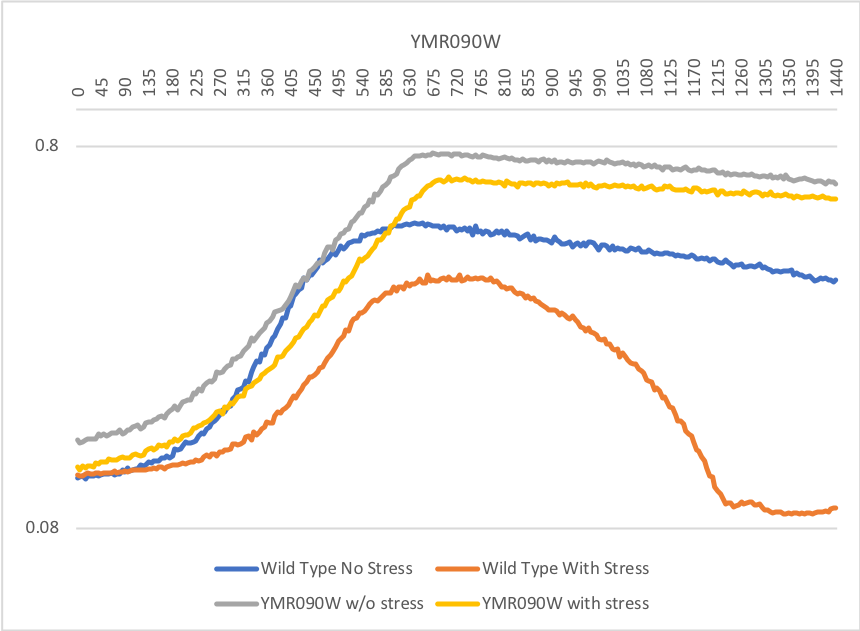 Cold Shock Protocol [[4]]
Cold Shock Protocol [[4]]
References
See Help:References on how to add references
- ↑ Giaever G, et al. (2002) Functional profiling of the Saccharomyces cerevisiae genome. Nature 418(6896):387-91 SGD PMID 12140549
- ↑ Huh WK, et al. (2003) Global analysis of protein localization in budding yeast. Nature 425(6959):686-91 SGD PMID 14562095
- ↑ Santos PM, et al. (2009) Insights into yeast adaptive response to the agricultural fungicide mancozeb: a toxicoproteomics approach. Proteomics 9(3):657-70 SGD PMID 19137554
- ↑ Boer VM, et al. (2003) The genome-wide transcriptional responses of Saccharomyces cerevisiae grown on glucose in aerobic chemostat cultures limited for carbon, nitrogen, phosphorus, or sulfur. J Biol Chem 278(5):3265-74 SGD PMID 12414795
- ↑ submitted by Viktor Boer on 2003-07-25
See Help:Categories on how to add the wiki page for this gene to a Category


